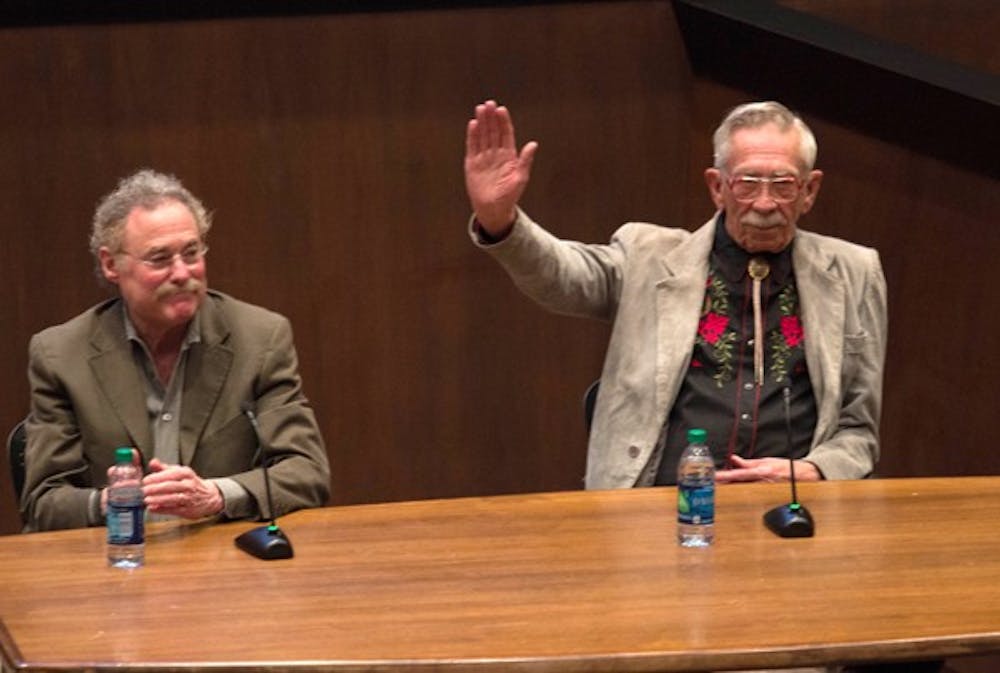
Pulitzer Prize winner and former Los Angeles Times reporter Barry Siegel had a rare opportunity: getting behind the door of attorney-client privilege to witness former Arizona convict Bill Macumber's meetings with lawyers during his appeal process.
Siegel, Macumber and Macumber's lawyers spoke of the perseverance needed to free Macumber from prison on Monday at Armstrong Hall on the Tempe campus.
Macumber said he was framed by his ex-wife for a double homicide that happened in 1962. As a result, he served 38 years in prison.
Larry Hammond, one of Macumber's lawyers and the chair of the Arizona Justice Project, said perseverance was the first lesson learned by those involved with Macumber's case.
"You won't find anyone who has persevered as Bill Macumber has," Hammond said.
Perseverance played a part but wasn't all of Macumber's case, said Bob Bartels, faculty adviser for the Arizona Justice Project and Macumber's other lawyer.
"Bill and his family made the story," he said.
When Siegel approached the lawyers about writing a book about Macumber's case, Hammond and Bartels disagreed.
Hammond knew his case was one of attorney-client privilege and embedding a journalist was not something lawyers did. However, he said he knew they could not succeed with the case if they didn't go about it a different way, something he conveyed to Macumber.
"The bottom line was that I couldn't see how the book could hurt," Macumber said.
He said during the panel discussion that he ordered one of Siegel's previous books, "A Death in White Bear Lake" to find out what kind of person Siegel was before their first meeting.
"What I saw was a very dedicated investigative journalist," Macumber said of Siegel. "He is a seeker of truth."
Siegel said that it was a great tribute to the Arizona Justice Project that they let him into the case.
"Larry and the (Justice) Project believed in the project by letting me watch without knowing where (the trial) would end," Siegel said.
At first, Bartels was a little more cynical at the thought of embedding Siegel into their ongoing case.
Bartels said he couldn't see how the media was going to help him or Macumber.
"I don't think Bill Macumber is sitting here because of the book," Bartels said. "The book didn't change any of that. It's a positive thing, because a lot more people know about the case."
Siegel said that despite Bartels's feelings in the beginning, Bartels shared a lot with him. He also said that no one in the Justice Project ever asked to guarantee his take on the story and never asked Siegel's opinion on the case.
"It speaks a lot to the trust they had in what they were doing," Siegel said.
During the discussion, Siegel said he told Macumber he would need to ask him detailed accounts of his childhood, the arrest and his life in prison.
Macumber kept journals of those three milestones and presented them to Siegel but forgot to mention it to his lawyers.
Although he never lost hope throughout the 38 years of fighting for his justice, Macumber said it did hit low points. He explained his hope as a roller coaster, where he would go from highs "to the depths of despair."
"I never all the way lost hope," Macumber said. "But for a time, there wasn't a great deal of hope left."
Macumber said he learned to control his emotions while in prison because "in prison a show of emotions leads to a consensus of weakness."
"I do get emotional now," Macumber said. "Emotions mean you still have a heart."
Siegel's book, "Manifest Injustice," is available now.
Reach the reporter at nrmirand@asu.edu or follow on Twitter at @natalieroxann.




